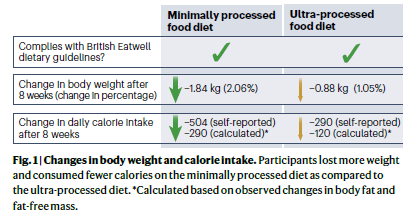I’m on the visionary panel. To register, click here.

I was asked to write an editorial commenting on a study published a couple of weeks ago that looked at changes in weight among people participating in a comparison of ultra-processed vs. minimally processed diets.
The study: Ultraprocessed or minimally processed diets following healthy dietary guidelines on weight and cardiometabolic health: a randomized, crossover trial. Nat Med (2025). https://doi.org/10.1038/s41591-025-03842-0.
The study has a long list of authors: Samuel J. Dicken, Friedrich C. Jassil, Adrian Brown, Monika Kalis, Chloe Stanley, Chaniqua Ranson, Tapiwa Ruwona, Sulmaaz Qamar, Caroline Buck, Ritwika Mallik, Nausheen Hamid, Jonathan M. Bird, Alanna Brown, Benjamin Norton, Claudia A. M. Gandini Wheeler-Kingshott, Mark Hamer, Chris van Tulleken, Kevin D. Hall, Abigail Fisher, Janine Makaronidis & Rachel L. Batterham .
It must have been a huge amount of work to conduct this trial. I can’t even imagine.
The lead author, Sam Dicken, explained the trial and its results on X.
My editorial has just been published in Nature Medicine: Ultra-processed diets promote excess calorie consumption (I have no idea why the editorial was not published at the same time as the study, but it is now out).
I fthought several things about the study to be especially interesting.
Here’s the summary from my editorial.

One of the co-authors on the study is Kevin Hall, who did a rigorously controlled clinical trial of ultra-processed v. minimally processed diets and reported participants to be unwittingly consuming 500 calories a day more on the ultra-processed.
His study has been criticized for being too short in duration: two weeks on each diet.
This study kept participants on one or the other diet for eight weeks, and got a smaller but similar result.
Dicken et al also addressed a frequent criticism of the concept of ultra-processed foods: that the category excludes healthy foods like whole wheat commercial bread, commercial yogurts, power bars, and the like. That’s what these participants were fed when they were on the healthy ultra-processed diet.
Here’s how I concluded my editorial:
Overeating, overweight, and increased risks for chronic disease are rapidly increasing public health problems for global societies. Dietary guidelines in the UK and the United States have had little effect on improving overall dietary intake. None of these guidelines considers the degree of processing; the findings from Dicken et al. suggest that they should.
Brazil’s dietary guidelines, issued in 2015, say “avoid ultra-processed foods.” Researchers in the United States have called for guidelines and regulatory approaches to reduce intake of ultra-processed foods.
Despite ongoing debates about their definition, classification, and effects on health, in the context of maintaining or losing weight the evidence points to a clear message: minimize intake of ultra-processed foods.
If nothing else, the study provided further evidence for this sensible dietary advice.
Dicken et al: press coverage